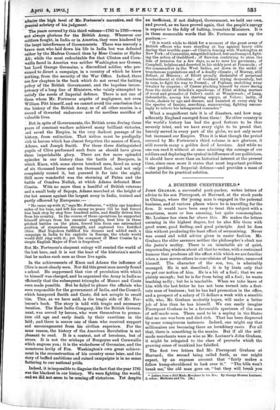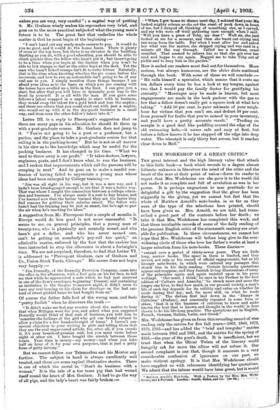A BUSINESS CHESTERFIELD.*
JOHN GRAHAM, a successful pork-packer, writes letters of advice to his son Pierrepont, at Harvard, at the stock yards in Chicago, where the-young man is engaged in the paternal business, and at various places where he is travelling for the firm. It would have been easy to treat this subject with a smartness, more or less amusing, but quite commonplace. Mr. Lorimer has risen far above this. He makes the letters amusing in the highest degree, but he also fills theni with good sense, good feeling, and good principle. And he does this without producing the least effect of sermonising. Never was sound and solid advice given in easier fashion. Mr. Graham the elder assumes neither the philosopher's cloak nor the jester's motley. There is an inimitable air of quiet, unpretending wisdom about all that he writes, with a restrained humour that produces all the effect with which we are familiar when a man moves others to convulsions of laughter, unmoved himself. The character of the son, too, is admirably managed. He is not described; it is by hints only that we get our notion of him. He is a bit of a fool ; that we see plainly enough; but he is far from being all a. fool ; he wants teaching sadly ; but he is teachable. When we take leave of him with the last letter he has not been turned into a first- rate man of business; but he has had promotion in the office, and a prospect of a salary of 75 dollars a week with a sensible wife, who, Mr. Graham modestly hopes, will make a better job of him than he has himself. We can easily imagine Pierrepont Graham to be a favourable specimen of the sons of self-made men. There used to be a saying in the States that no one was born and died rich. That has been disproved by some conspicuous instances. Indeed, one might say that millionaires are becoming there an hereditary caste. For all that, there is something in the maxim. But if all the self- made merchants were as wise as Mr. Lorimer's John Graham, it might be relegated to the class of proverbs which the growing sense of mankind has falsified.
The first two letters find Mr. Pierrepont Graham at Harvard; the second being called forth, as one might expect, by an expense account that "fairly makes a fellow hump-shouldered to look over it." "The bills won't break me," the old man goes on, "but they will break you
- • IettOrs from a Self-Made Merchant to his Bon. By George Horace Lorimer. L ,ndon : Methuen and Co. [6..]
-
unless you are very, very careful " ; a capital way of putting, it. Mr. Graham wisely makes his reproaches very brief, and goes on to the more practical subject of what the young man's future is to be. The great fact that underlies the whole matter is that he must begin at the beginning " I can't hand out any ready-made success to you. It would do you no good, and it would do the house harm. There is plenty of room at the top here, but there is no elevator in the building.
Starting as you do, with a good education, you should be able to climb quicker than the fellow who hasn't got it ; but there's going
to be a time when you begin at the factory when you won't he able to lick stamps so fast as the other boys-at the desk. Yet the man who hasn't licked stamps isn't fit to write letters. Naturally, that is the time when knowing whether the pie comes before the ice-cream, and how to run an automobile isn't going to be of any real use to you. I simply mention these things because I am afraid your ideas as to the basis on which you are coming with the house have swelled up a little in the East. I can give you a start, but after that you will have to dynamite your way to the front by yourself. It is all with the man. If you gave some fellows a talent wrapped in a napkin to start with in business, they would swap the talent for a gold brick and lose the napkin ; and there are others that you could start out with just a napkin, who would set up with it in the dry-goods business in a small way, and then coax the other fellow's talent into it."
Letter M. is a reply to Pierrepont's suggestion that as there are many gaps in his education he should fit them up with a post-graduate course. Mr. Graham does not jump to it. "You're not going to be a poet or a professor, but a packer, and the place to take a post-graduate course for that calling is in the packing-house." But he is not at all narrow in his view as to the knowledge which may be useful for the
packing business. It has changed in his time. "What we used to throw away is our profit." "It takes doctors, lawyers, engineers, poets, and I don't know what, to run the business, and I reckon that improvements which call for parsons will be creeping in next." And he goes on to make a candid con- fession of having failed to appreciate a young man whose ideas had been enlarged by College training :—
"Jim was all right in his way, but it was a new way, and I hadn't been broad-gauged enough to see that it was a better way. That was where I caught the connection between a college educa- tion and business. I've always made it a rule to buy brains, and I've learned now that the better trained they are the faster they find reasons for getting their salaries raised. The fellow who hasn't had the training may be just as smart, but he's apt to paw the air when he's reaching for ideas."
A suggestion from Mr. Pierrepont that a couple of months in Europe would do him good is not more successful. "It Deems to me, on general principles, that a young man of twenty-two, who is physically and mentally sound, and who hasn't got a dollar, and who has never earned one, can't be getting on somebody's pay-roll too quick," an admirable maxim, enforced by the fact that the cashier has been instructed to stop the allowance in about a fortnight's time. We are not surprised, therefore, to find that Letter VI. is addressed to "Pierrepont Graham, care of Graham and Co., Union Stock Yards, Chicago." His career does not begin very happily :—
" Jim Donnelly, of the Donnelly Provision Company, came into the office in the afternoon, with a fool grin on his fat face, to tell me that while he appreciated a note which he had just received in one of the firm's envelopes, beginning Dearest,' and containing an invitation to the theatre to-morrow night, it didn't seem to have any real bearing on his claim for shortage on the last car- load of sweet pickled hams he had bought from us."
Of course the father falls foul of the wrong man, and feels "pretty foolish" when he discovers the truth :—
"It didn't make me feel any sweeter about the matter to hear that when Milligan went for you, and asked what you supposed Donnelly would think of that sort of business, you told him to `consider the feelings of the girl who got our brutal refusal to allow a claim for a few hundredweight of hams.' I haven't any special objection to your writing to girls and telling them that they are the real sugar-cured article, for, after all, if you overdo it, it's your breach-of-promise suit, but you must write before eight or after six. I have bought the stretch between those hours. Your time is money—my money—and when you take half an hour of it for your own purposes, that is just a petty form of petty larceny."
But we cannot follow our Telemachus and his Mentor any further. The' subject in hand is always excellently well treated, and theria.re some capital illustrative stories. There is one of which the moral is, " Don't do business with a woman." It is the tale of a too tame pig that had wound itself round the heart of Mrs. Graham. It-had to go the way of all pigs, and the lady's heart was fairlytroken
• "When I got home to dinner next dip, I noticed-that 'eur Ma looked mighty solemn as she set the roast of pork down in front of me, but I strayed off, thinking of something else, as I carved, and my wits were off wool gathering sure enough when I said 'Will you have a piece of Toby, my. dear P' Well sir, she just looked at me for a moment, and then she burst out crying and, ran away from the table. But when I went after her and aske& her what was the matter, she stopped crying and was mad in a minute all the way through. Called me a heartless, cruel . cannibal. That seemed to relieve her so that she got over he/- mad and began to cry again. Begged me to take Toby out of pickle and to bury him in the garden.'
How it ended our readers must find out for themselves. More serious, but always humorous, are the obiter dicta scattered
through the book. With some of these we will conclude :— " He calls himself a specialist, which means that it costs me ten dollars every time he has a look at my tongue, against two that I would pay the family doctor for gratifying his curiosity." "Marriages may be made in heaven, but most engagements are made in the back parlour with the gas so low that a fellow doesn't really get a square look at what he's taking." "Add 50 per cent, to your estimate of your neigh- bour for virtues that you can't see, and deduct 50 per cent. from yourself for faults that you've missed in your inventory, and you'll have a pretty accurate result." "Trading on margin is a good deal like paddling around the edge of the old swimming hole,—it seems safe and easy at first, but before a fellow knows it he has stepped off the edge into deep water. The wheatpit is only thirty feet across, but it reaches clear down to Hell."











































 Previous page
Previous page